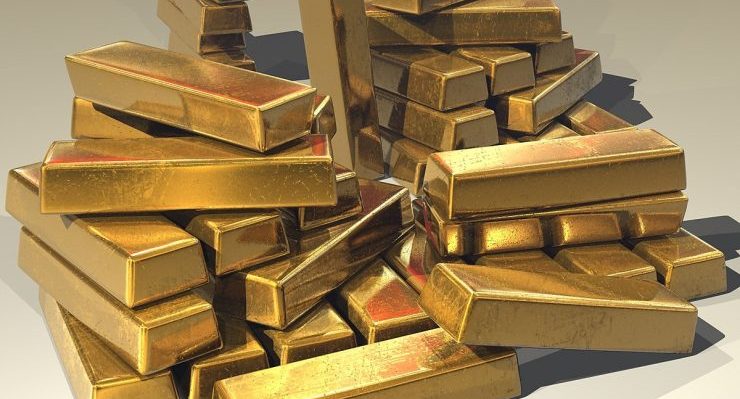
As the pandemic ravages the world, Australians are going mad for something completely useless and very expensive. Gold. Physical gold. Shiny yellow bars and coins.
The value of imported gold has skyrocketed. People are worried about the economy and bet owning gold will be smarter than cash or shares. So far they’ve been on the money: the gold price is at record highs.
Gold bullion is arriving in the country at a rate exceeded only once — during the global financial crisis, as the next chart shows. The six-month average is closing in fast on $1 billion of gold imports a month.
This is what they call non-monetary gold — not jewellery and the Reserve Bank doesn’t own it. (The RBA has 80 tonnes of gold but isn’t buying or selling.) It includes industrial gold, like dental gold and wiring, but that does not explain the surge.

The above chart shows gold in Aussie dollar terms. Some of the recent rise in imports is due to extra volumes coming in, and some is due to its increased value. The gold price had been rising but it has soared in the pandemic to more than A$80 a gram, or more than US$2000 an ounce.
A “troy ounce” of gold is bigger than a regular ounce — a little over 30 grams. But you don’t get much volume for your money. Gold is very dense. You pay US$2000 for a puny little sliver. Expect a little flat piece of metal roughly 4cm by 2cm by 2mm, a fraction around the size of a credit card.

The modest size of gold makes storing large values plausible. There has long been people — known derisively as “gold bugs” — who love to own bullion. Since the pandemic struck, their numbers have boomed. This Google Trends data shows the search interest in the term bullion in Australia. It’s up as much as four-fold over usual.

As the gold price has shot up people are also buying up silver bullion. The price of silver has gone vertical, doubling since March. You get a lot more physical silver for your money — A$1200 will buy you a kilogram.
The pandemic has seen us embrace much that is new: we are conversant in Zoom, N95 masks, alcohol hand sanitiser and genomic sequencing. But uncertainty also sends us back to things old and proven. Sourdough, obviously, but also gold. It is the classic safe-haven asset in times of strife.
Gold is a defence against expansionary monetary policy. If extremely low rates and money printing ever achieve inflation, the buying power of cash will fall. Gold is considered the ultimate protection against monetary inflation as it has a fixed supply.
The alchemists never figured out how to make more of it, and if you gathered together all the gold ever mined it would fit in just over three Olympic-sized swimming pools.
Will inflation rise? Well, the US Federal Reserve chairman Jerome Powell recently committed the US to a monetary policy stance that would generate higher inflation. He made a landmark speech on August 27 in which he pledged to let inflation run hotter before clamping down on it.
“Following periods when inflation has been running below 2%, appropriate monetary policy will likely aim to achieve inflation moderately above 2% for some time,” he said.
The RBA Governor Philip Lowe has also pledged to review Australia’s monetary policy settings. The classic trade-off in central banking is that generating higher employment requires letting the economy run hot in a way that also creates price inflation. The RBA has been good at avoiding inflation recently but at a cost: high underemployment.
It’s not clear if it truly has the stomach to let inflation run, nor whether it possesses the tools to reverse the long-run fall in inflation. But if it does, expect gold to remain very popular.








It’s an interesting investment option, and a safe haven, except it isn’t really. If and when things improve gold’s value can decrease rather quickly. Like the splurge in retail share trading it’s more likely that this is soaking up excess cash that people can’t spend (while others struggle to put food on the table).
There is no safe haven, but holding cash is pretty safe. The bogey of inflation is a little bit BS, firstly it doesn’t have price falls of 10 or 20% in a day, which happens plenty in shares, you tend to have plenty of notice of rising prices because you are buying things every day, which means you know about and daily research your investment options, and at the moment deflation in CPI is a greater threat. And finally, none of the bowfins really know what causes inflation and where it will go. Economists have all sorts of wonderful theories, all of them disproved by the last 70 years history of economic expansion in the west. So there’s that.
Bowfins. Yeah, I wrote bowfins, because they are … what?
Boffins, of course. Spell check lives on another planet.
Completely useless gold *like 2 sentences pass* oh btw we actually use gold.
When you purchased it 5 years ago you reap the benefits, buying now is pointless.
How long is it now since the official “inflation” figure bore any real world reality to most people’s daily lives, expectations and costs? Twenty years, twenty five? Official bullshit.